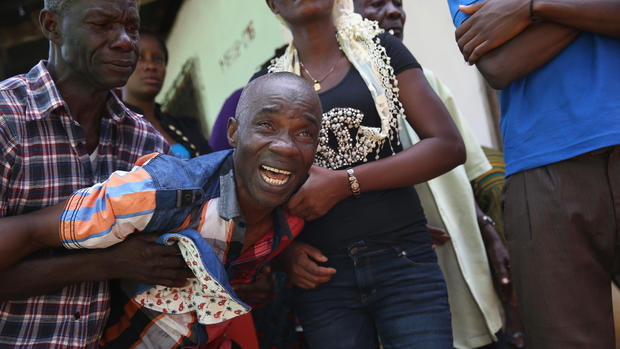Liberian doctor dies despite experimental Ebola treatment
A Liberian doctor who was among three Africans to receive an experimental Ebola drug has died, the country's information minister said Monday. Only six people in the world have been given the experimental drug -- known as ZMapp -- which had not been previously tested on humans.
Dr. Abraham Borbor, the deputy chief medical doctor at the country's largest hospital, had been among three Liberians, and the first Africans, who received the drug, ZMapp. Two Americans received the untested drug and survived. A Spaniard infected with Ebola received the treatment but died. There was no update given on the two other Liberians who took doses of the drug.
Borbor "was showing signs of improvement but yesterday he took a turn for the worse," Information Minister Lewis Brown told The Associated Press. It wasn't clear if he died late Sunday or on Monday.
Ebola has killed more than 1,400 people across West Africa. There is no proven treatment or vaccine for the disease that can cause a grisly death with bleeding from the eyes, mouth and ears.
Earlier this month, the U.S. National Institute of Allergy and Infectious Disease (NIAID), a division of the National Institutes of Health, announced plans to expedite research on a different drug, a vaccine against Ebola that's been shown to be effective in primates. A clinical trial on humans may begin as early as next month.
"We tested it in monkeys, it looks very good, it protects monkeys completely from challenge with Ebola. They don't get sick and they don't die, whereas unvaccinated monkeys all do," Dr. Anthony Fauci, director of NIAID, told "CBS This Morning" in early August. "We're going to start human trials in September in normal volunteers. And if that looks good, by January we should be able to scale up in its production."
The virus can only be transmitted through direct contact with the bodily fluids of the sick or from touching victims' bodies, leaving doctors and other health care workers most vulnerable to contracting it.
The small supply of ZMapp is now said to be exhausted, and it is expected to be months before more can be produced by its U.S. maker.
Health experts caution that the drug had never been tested in humans before and it was unclear whether it actually works. It appeared to help two Americans who received it, but experts note there is a huge gap between the treatment the two Americans got at an Atlanta hospital, where five infectious disease experts and 21 nurses provided rigorous care, and the medical care available to victims in West Africa, where even such basics as sterile fluids can be in short supply.
